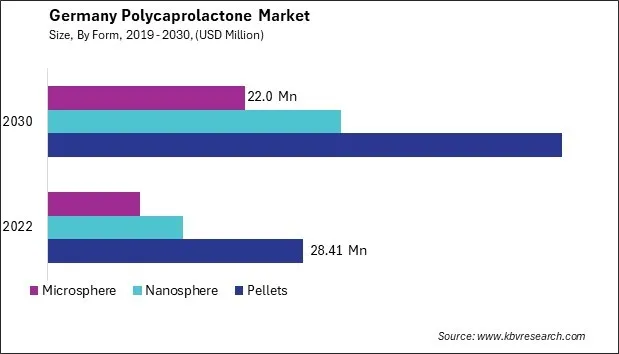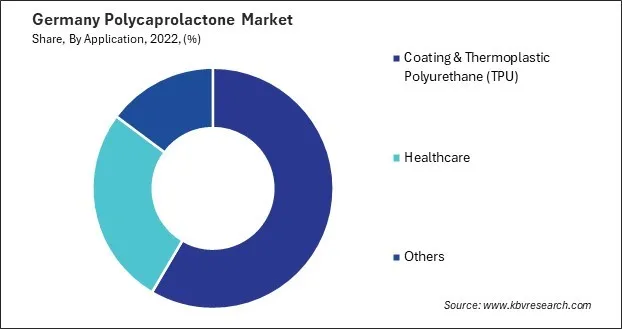Germany Polycaprolactone Market Size, Share & Trends Analysis Report By Production Method, By Form (Pellets, Nanosphere, and Microsphere), By Application, and Forecast, 2023 - 2030
Published Date : 16-May-2024 |
Pages: 69 |
Report Format: PDF + Excel |
COVID-19 Impact on the Germany Polycaprolactone Market
The Germany Polycaprolactone Market size is expected to reach $111.68 Million by 2030, rising at a market growth of 9.6% CAGR during the forecast period. In the year 2022, the market attained a volume of 52.85 Hundred Tonnes, experiencing a growth of 8.9% (2019-2022).
Germany's polycaprolactone market has witnessed significant growth in recent years, driven by its versatile applications across various industries such as automotive, packaging, healthcare, and electronics. One of the key factors driving the growth of the polycaprolactone market in Germany is the increasing demand for sustainable and eco-friendly materials. With growing concerns over environmental pollution and the need to reduce carbon footprint, there has been a shift towards adopting biodegradable polymers like polycaprolactone (PCL).

Germany, known for its advanced engineering and innovation, has emerged as a key player in the polycaprolactone market. The country's strong emphasis on sustainability and environmental awareness has further fueled the demand for biodegradable polymers like PCL. Moreover, the healthcare sector in Germany has been leveraging polycaprolactone for various medical applications, including tissue engineering, wound healing, and drug delivery. PCL's biocompatibility and biodegradability make it an ideal material for developing implants, scaffolds, and controlled-release systems in the medical field. Germany's strong research and development infrastructure has also contributed to advancements in polycaprolactone-based medical technologies.
The COVID-19 pandemic has significantly impacted the polycaprolactone market in Germany. The increased awareness of hygiene and sanitation has led to a surge in demand for medical products and packaging materials, including those made from biodegradable polymers like PCL. Fluctuations in raw material prices, transportation disruptions, and consumer behavior shifts have all impacted the demand and supply dynamics of PCL in Germany. However, the resilience of Germany's manufacturing sector and ongoing efforts to promote sustainability are expected to mitigate these challenges in the long run.
Market Trends
Expansion of the automotive industry
The automotive industry in Germany has been witnessing a significant expansion, with a notable impact on the polycaprolactone market. One key factor driving the expansion of polycaprolactone in the German automotive sector is its compatibility with stringent environmental regulations. As Germany strives to reduce its carbon footprint and meet sustainability targets, automakers increasingly use eco-friendly materials like polycaprolactone for various components.
German automakers and suppliers have been at the forefront of integrating polycaprolactone-based materials into vehicle components. Polycaprolactone (PCL) offers lightweight, durable, and eco-friendly alternatives to traditional plastics, from interior trims to exterior panels. Automakers in Germany are increasingly turning to PCL to meet stringent environmental regulations while maintaining high-performance standards.
The growth of the automotive industry in Germany has also spurred advancements in polycaprolactone production technology. With increasing demand from automakers, manufacturers invest in research and development to enhance production processes, improve material properties, and reduce costs. These efforts are further fueling the adoption of polycaprolactone in the automotive sector and strengthening Germany's position as a key player in the polycaprolactone market.
According to the Germany Trade & Invest in 2021, German original equipment manufacturers (OEMs) demonstrated their commitment to research and development (R&D) by investing nearly EUR 28.3 billion. Remarkably, the automotive sector emerged as Germany's most innovative industry, constituting 34.1 % of the nation's total industry R&D spending, which reached approximately EUR 71 billion in 2020. This underscores the significance of the automotive industry's expansion in Germany, particularly in the polycaprolactone market. Thus, the integration of polycaprolactone in the German automotive industry underscores a commitment to environmental sustainability and innovation, driving both industry expansion and technological advancements.
Growing demand for biodegradable alternativess
The polycaprolactone market in Germany is experiencing a notable surge in demand driven by an increasing emphasis on sustainable and environmentally friendly alternatives. With growing concerns over the ecological impact of traditional plastics, there has been a discernible shift towards biodegradable materials, and polycaprolactone (PCL) has emerged as a promising solution. One of the key drivers behind the growing demand for biodegradable alternatives in Germany is the country's strong commitment to environmental sustainability.
Germany has long been at the forefront of environmental initiatives, with stringent regulations and policies to reduce plastic pollution and promote eco-friendly materials. Furthermore, Germany's vibrant industrial sector plays a significant role in driving the demand for PCL. Packaging and automotive industries are increasingly turning to biodegradable materials to meet regulatory requirements and consumer preferences. The versatility of PCL makes it particularly appealing for a wide range of applications, including 3D printing, drug delivery systems, and compostable packaging.
Additionally, consumer awareness and preferences are shaping the industry dynamics in Germany. With growing awareness about the environmental impact of plastic waste, consumers are actively seeking out biodegradable and environmentally sustainable products. This shift in German consumer behavior is driving companies to invest in research and development of biodegradable materials like PCL to meet the industry's evolving demands. Therefore, the surge in demand for the polycaprolactone market in Germany is driven by stringent environmental regulations, the country's commitment to sustainability, diverse industrial applications, and evolving consumer preferences towards biodegradable alternatives.

Competition Analysis
In Germany, the polycaprolactone market is marked by several key companies operating within this sector. These companies play significant roles in manufacturing, distributing, and innovating polycaprolactone-based products across various industries. One prominent player in the German polycaprolactone market is Perstorp Holding AB. Perstorp is a global leader in the production of specialty chemicals, including polycaprolactone. The company offers a range of PCL grades tailored to meet the specific requirements of different applications. With a focus on sustainability and innovation, Perstorp continues to invest in research and development to enhance the properties and performance of its PCL products, catering to the evolving needs of customers in Germany.
Another key player in the German polycaprolactone market is BASF SE. BASF is one of the world's largest chemical companies, with a diversified portfolio that includes polycaprolactone-based products. The company's PCL offerings find applications in areas such as 3D printing, coatings, and additives for various industries. Leveraging its expertise in polymer chemistry, BASF remains at the forefront of innovation, developing advanced PCL formulations to address emerging trends and customer demands in Germany's dynamic industry.
Evonik Industries AG is also a significant player in the German polycaprolactone market. As a leading specialty chemicals company, Evonik produces high-quality PCL under the brand name VESTAKEEP®. VESTAKEEP® PCL is known for its excellent mechanical properties, biocompatibility, and processability, making it suitable for medical implants, drug delivery systems, and other demanding applications. Evonik's strong focus on sustainability and customer collaboration further enhances its position in the German polycaprolactone market.
In addition to these major players, several smaller companies contribute to the diversity and competitiveness of the polycaprolactone market in Germany. These include specialty chemical manufacturers, compounders, and distributors that supply polycaprolactone resins, compounds, and finished products to various industries. Many companies differentiate themselves through niche offerings, custom formulations, or superior customer service, catering to specific industry segments and applications. Thus, the German polycaprolactone market is characterized by diverse companies committed to innovation, sustainability, and customer satisfaction.
List of Key Companies Profiled
- Corbion N.V.
- Otto Chemie Pvt. Ltd.
- BASF SE
- Perstorp Holding AB (PETRONAS Chemicals Group Berhad)
- Daicel Corporation
- Haihang Industry Co., Ltd. (Haihang Group)
- Merck KGaA
- Polysciences, Inc.
- Shenzhen Esun Industrial Co., Ltd.
Germany Polycaprolactone Market Report Segmentation
By Production Method
- Ring Opening Polymerization
- Polycondesation of Carboxylic Acid
By Form
- Pellets
- Nanosphere
- Microsphere
By Application
- Coating & Thermoplastic Polyurethane (TPU)
- Healthcare
- Others
1.1 Market Definition
1.2 Objectives
1.3 Market Scope
1.4 Segmentation
1.4.1 Germany Polycaprolactone Market, by Production Method
1.4.2 Germany Polycaprolactone Market, by Form
1.4.3 Germany Polycaprolactone Market, by Application
1.5 Methodology for the research
Chapter 2. Market Overview
2.1 Introduction
2.1.1 Overview
2.1.1.1 Market Composition and Scenario
2.2 Key Factors Impacting the Market
2.2.1 Market Drivers
2.2.2 Market Opportunities
2.2.3 Market Restraints
2.2.4 Market Challenges
2.2.5 Market Trends
2.3 Porter’s Five Forces Analysis
Chapter 3. Germany Polycaprolactone Market
3.1 Germany Polycaprolactone Market by Production Method
3.2 Germany Polycaprolactone Market by Form
3.3 Germany Polycaprolactone Market by Application
Chapter 4. Company Profiles – Global Leaders
4.1 Corbion N.V.
4.1.1 Company Overview
4.1.2 Financial Analysis
4.1.3 Segmental and Regional Analysis
4.1.4 Research & Development Expense
4.1.5 SWOT Analysis
4.2 Otto Chemie Pvt. Ltd.
4.2.1 Company Overview
4.2.2 SWOT Analysis
4.3 BASF SE
4.3.1 Company Overview
4.3.2 Financial Analysis
4.3.3 Segmental and Regional Analysis
4.3.4 Research & Development Expense
4.3.5 Recent strategies and developments:
4.3.5.1 Product Launches and Product Expansions:
4.3.5.2 Geographical Expansions:
4.3.6 SWOT Analysis
4.4 Perstorp Holding AB (PETRONAS Chemicals Group Berhad)
4.4.1 Company Overview
4.4.2 Financial Analysis
4.4.3 Segmental and Regional Analysis
4.4.4 Recent strategies and developments:
4.4.4.1 Product Launches and Product Expansions:
4.4.5 SWOT Analysis
4.5 Daicel Corporation
4.5.1 Company Overview
4.5.2 Financial Analysis
4.5.3 Segmental and Regional Analysis
4.5.4 Research & Development Expenses
4.5.5 SWOT Analysis
4.6 Haihang Industry Co., Ltd. (Haihang Group)
4.6.1 Company Overview
4.7 Merck KGaA
4.7.1 Company Overview
4.7.2 Financial Analysis
4.7.3 Segmental and Regional Analysis
4.7.4 Research & Development Expense
4.7.5 SWOT Analysis
4.8 Polysciences, Inc.
4.8.1 Company Overview
4.9 Shenzhen Esun Industrial Co., Ltd.
4.9.1 Company Overview
TABLE 2 Germany Polycaprolactone Market, 2023 - 2030, USD Million
TABLE 3 Germany Polycaprolactone Market, 2019 - 2022, Hundred Tonnes
TABLE 4 Germany Polycaprolactone Market, 2023 - 2030, Hundred Tonnes
TABLE 5 Germany Polycaprolactone Market by Production Method, 2019 - 2022, USD Million
TABLE 6 Germany Polycaprolactone Market by Production Method, 2023 - 2030, USD Million
TABLE 7 Germany Polycaprolactone Market by Form, 2019 - 2022, USD Million
TABLE 8 Germany Polycaprolactone Market by Form, 2023 - 2030, USD Million
TABLE 9 Germany Polycaprolactone Market by Form, 2019 - 2022, Hundred Tonnes
TABLE 10 Germany Polycaprolactone Market by Form, 2023 - 2030, Hundred Tonnes
TABLE 11 Germany Polycaprolactone Market by Application, 2019 - 2022, USD Million
TABLE 12 Germany Polycaprolactone Market by Application, 2023 - 2030, USD Million
TABLE 13 Germany Polycaprolactone Market by Application, 2019 - 2022, Hundred Tonnes
TABLE 14 Germany Polycaprolactone Market by Application, 2023 - 2030, Hundred Tonnes
TABLE 15 Key Information – Corbion N.V.
TABLE 16 Key Information – Otto Chemie Pvt. Ltd.
TABLE 17 Key Information – BASF SE
TABLE 18 Key Information – Perstorp Holding AB
TABLE 19 Key Information – Daicel Corporation
TABLE 20 Key Information – Haihang Industry CO., LTD.
TABLE 21 key Information – Merck KGaA
TABLE 22 Key Information – Polysciences, Inc.
TABLE 23 Key Information – Shenzhen Esun Industrial Co., Ltd.
List of Figures
FIG 1 Methodology for the research
FIG 2 Germany Polycaprolactone Market, 2019 - 2030, USD Million
FIG 3 Key Factors Impacting Polycaprolactone Market
FIG 4 Porter’s Five Forces Analysis - Polycaprolactone Market
FIG 5 Germany Polycaprolactone Market share by Production Method, 2022
FIG 6 Germany Polycaprolactone Market share by Production Method, 2030
FIG 7 Germany Polycaprolactone Market by Production Method, 2019 - 2030, USD Million
FIG 8 Germany Polycaprolactone Market share by Form, 2022
FIG 9 Germany Polycaprolactone Market share by Form, 2030
FIG 10 Germany Polycaprolactone Market by Form, 2019 - 2030, USD Million
FIG 11 Germany Polycaprolactone Market share by Application, 2022
FIG 12 Germany Polycaprolactone Market share by Application, 2030
FIG 13 Germany Polycaprolactone Market by Application, 2019 - 2030, USD Million
FIG 14 SWOT Analysis: Corbion N.V.
FIG 15 Swot Analysis: Otto Chemie Pvt. Ltd.
FIG 16 SWOT Analysis: BASF SE
FIG 17 Swot Analysis: Perstorp Holding AB
FIG 18 SWOT Analysis: Daicel Corporation
FIG 19 Swot Analysis: Merck KGaA